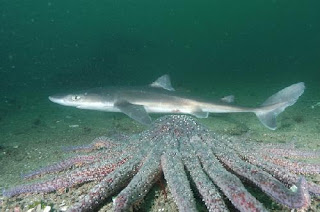True Wild Life | Spiny Dogfish | The spiny dogfish is one of the most abundant species of shark in the world is also commonly known as the piked dogfish, the codshark and the thorndog. The spiny dogfish is the most well-known of the dogfish species and is also thought to be the most well-researched shark species in the world. The spiny dogfish is found worldwide across the Atlantic, Indian and Pacific Oceans. The spiny dogfish tends to be be found in the warmer coastal waters although it is not uncommon to spot spiny dogfish hunting in the freezing sub-Antarctic waters.
The spiny dogfish is a small-sized shark with a grey coloured body that has a light underside and little white spots on the back of the spiny dogfish. The spiny dogfish also has large eyes and a short snout and unlike many other species of shark, the spiny dogfish does has have an anal fin. The most distinctive feature of the spiny dogfish are the two spikes found on the back of the spiny dogfish, one spike in front of each dorsal fin. The spikes on the back of the spiny dogfish are mildly poisonous and are mainly used in defence.
The spiny dogfish is a carnivorous animal and therefore survives on a purely meat-based diet. Fish, squid and crustaceans are the most common meals for the spiny dogfish, but the spiny dogfish is also known to hunt octopus and even other sharks. Due to its relatively large size, aggressive nature and poisonous spikes, the only real predators of the spiny dogfish are larger sharks, humans and the occasional killer whale.
As with some other species of shark, the spiny dogfish does not lays its eggs in the water to hatch, but the spiny dogfish fry instead hatch inside their mother and then emerge into the open ocean. After a gestation period that can last up to 2 years (the longest of any other vertebrate), the female spiny dogfish will produce a little of between 2 and 15 spiny dogfish pups.




No comments:
Post a Comment